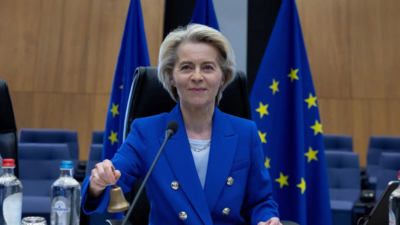
[ad_1]
The European Union General Court canceled the decision of the European Commission, which rejected a journalist from the New York Times to reach the text messages that were exchanged between the Chairman of the Committee, the Ursula von der Lyan and the pharmaceutical company, Albert Burla, CEO of Pfizer. The rule represents an important legal and political blow to the European Union’s executive arm, raising new doubts about the leadership of von der Lynn leadership and its dealings with transparency obligations.Olivier Howeidman of the European Observatory, which is monitored by Brussels, told DW: “Von der Layen collected greater strength than any other president before it, as the committee led a central and secret approach – and this has clearly led to reverse results.”The controversial Pfizergate issue includes messages exchanged during the European Union negotiations on the Covid-19 vaccine contract with Pfizer during the Coronavirus virus. It was hurt by the presence of special communication for the first time in an interview in 2021, which caused widespread concern about the usual decision -making in the heart of the European Union.Later that year, the New York Times Matina Stefis-Jeddaf submitted a request to reach the messages, according to the laws of transparency in the European Union, which the committee rejected, claiming that it did not possess it. This rejection prompted the United States daily to challenge the decision before the General Court.
No “reasonable interpretation”
The European Union Court has now concluded that the committee failed to justify its claim that it does not have the documents required with credibility – and that it had not proven that it had made sufficient efforts to determine or preserve its location. The judges also ruled that the text messages sent in the context of public purchases must be treated as official documents for the European Union.In an interview with DW, Shari Hindes of Transparency International said the decision was a “real victory for transparency”, adding that it represents a step towards restoring public confidence and institutional accountability.In response to the ruling, the European Commission said that it will notice the decision of the General Court and confessed to the need to provide a more detailed explanation about the reason for not being able to provide the required text messages. However, she confirmed that the court did not challenge the policy of registering comprehensive documents for the committee, and therefore said, there was no change in these rules. The committee said in a statement: “Transparency was of utmost importance,” and it reaffirms its commitment to openness and accountability under the current legal framework.The main executive of the European Union can now resume the ruling or compliance with either the issuance of messages – if it is still present – or providing a detailed account for their absence, including information about whether it is deleted and if that is in any circumstances.
“A humiliation and resounding defeat”
“The committee continues to repeat its commitment to transparency, but when it comes to implementing these principles, it is limited to,” said Bevy Lenino Sanddrag, a professor of European law across the National University of Helsinki, to DW, adding that the body did not recognize the problem. The reaction of many European Parliament members was sharply. Martin Shaidwan, the co -chair of the left group, described the referee “humiliation and resounding defeat” of the committee. Von der Lin was accused of damaging democracy through its company and demanding the publication of messages immediately. He warned that anything less than that would be irresponsible – and reasons for it to step down.Hoodman has argued that, through the nomination of the same institution in charge of enforcing the European Union Law and supervising the vaccine negotiations directly, von der Lin played a dual role “created a clear conflict in interests.” He said that the ruling was not only a scandal for the European Commission, but for its president.He said that when an institution responsible for enforcing transparency failed to maintain its own leadership, the audience’s confidence in the end of the end failed, especially if the leadership benefits from the lack of scrutiny. “This has damaged confidence in both the committee and the European Union as a whole,” he said.Moreover, he added that although the committee defended its approach by indicating the urgency of the epidemic, crises conditions cannot justify the lack of transparency. “The committee must start seeing transparency as something that embraces it, not fear. Otherwise, it nourishes conspiracy theories instead of confidence.”
“Accountability and Control” is required
Monitoring transparency and legal experts said that the court’s decision called for a turning point in dealing with Brussels with executive contacts. “Decisions that affect millions should not be made through special texts,” Hindes said. “They must happen in official settings, with accountability and control.”The message from critics is clear: Policies should not be made, especially when it comes to public health and financing, in the shade.The controversy comes at a sensitive time for the European Union. On the far right, the national forces gain a force in many member states, and many citizens are increasingly swinging from Brussels, an institution that is one of the decisive assets.The European Parliament may now demand an independent investigation, and civil society groups call for tougher regulations to ensure the archiving of all official and accessible contacts.Whether Von Der Leyen can remain unconfirmed. But with intense legal audit and general confidence on the line, her presidency now faces one of her most dangerous tests so far.

